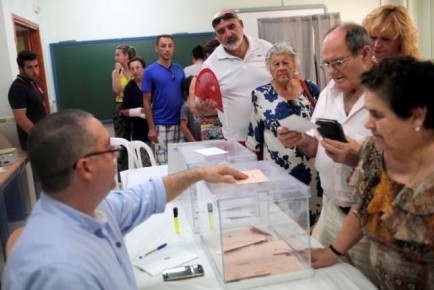
Third time’s a charm: Spaniards may have to go back to the polls on Christmas Day.
High farce left the building weeks ago. This is now in the realm of the truly bizarre: it is looking increasingly likely that Spaniards will have to go to the polls for a third time in the space of a year to vote through the general election first held on December 20 last year – and the next vote is probably going to fall on Christmas Day…
The second inconclusive general election, held in June, delivered very little change in the impasse seen in the first: acting Prime Minister Mariano Rajoy’s People’s Party (PP) once again won the most votes, but once again the PP did not win enough votes to secure a majority, nor enough friends to form a coalition.
And so while a third election was always a possibility, there had been hope over the summer that the various party leaders might be able to find a compromise. Indeed, just a few days ago Rajoy agreed to a six-point plan of action issued by the centre-right Ciudadanos party in exchange for their support in a coalition. The PM also agreed to submit himself to parliament for a confidence vote at the end of August.
However, the main sticking point – and it’s a big one – remains: the PP’s biggest rivals, the Socialists, are simply unlikely to back down and abandon its long-held and ideological opposition to Rajoy and the PP. And without their support or abstinence from the vote, the chances are high that the deadlock will not be broken.
Which is where things get interesting. Following a vote of no confidence – which appears likely – Spanish law decrees that the King must dissolve parliament and fix an election date 54 days later.
Now, with the confidence vote due on August 30, people have being doing the maths on this and figured out that the new election date would be, yes, you guessed it, Christmas Day.
Few, if any, Spaniards will fancy the prospect of breaking off from family, food and festivities to trudge to their nearest polling booth to vote for a third time on what is essentially the same election.
Hence, sceptics are worried that turnout could fall sharply if the election is held on December 25. Others, however, think that the date could have a positive impact: with families gathered together and off work, political debates are likely to be a hot topic around the dinner table, which could prompt an uptick in people going out to vote.
The fact that the electorate is likely to be asked to vote for a third time serves to highlight a growing dissatisfaction with Spain’s political climate, which has for too long been dominated by the two largest parties, the PP and the Socialists.
However, since the very first deadlock in December last year, Spain has been doing just fine without a proper government. Job numbers are up, GDP is growing at one of the fastest rates in Europe, the property market has recovered strongly and tourism is stronger than it has ever been… so if the country can do all this without proper leadership, Spaniards across the nation might not be so against a third, fourth, fifth or even sixth vote…
 en
en



 Vlaams-Nederlands
Vlaams-Nederlands
0 Comments
Leave a Comment
DISCLAIMER
The opinions and comments expressed by contributors to this Blog are theirs alone and do not necessarily reflect the views of VIVA Homes Under the Sun Ltd, any of its associated companies, or employees; nor is VIVA to be held responsible or accountable for the accuracy of any of the information supplied.
Have you got something to say?